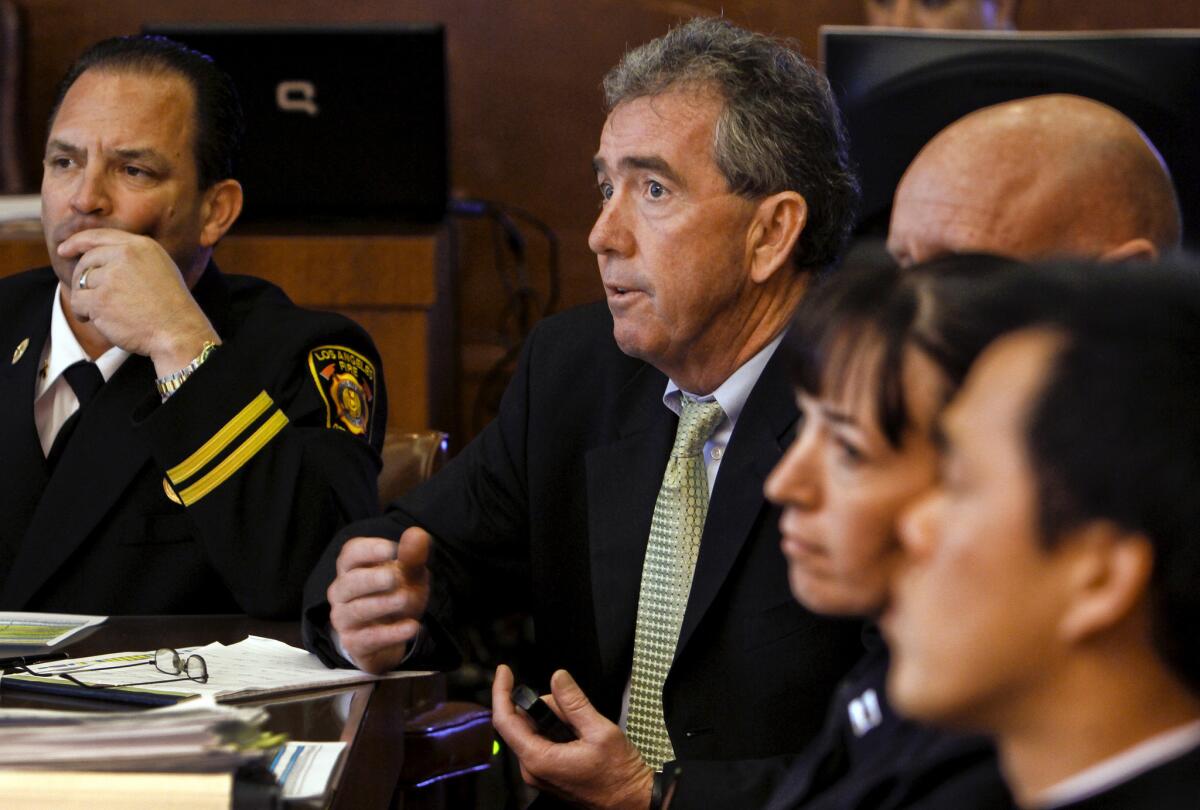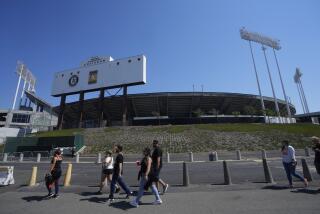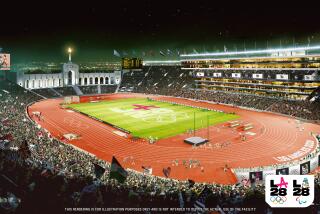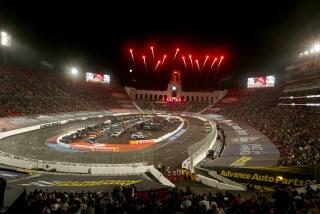L.A. Coliseum manager quits over aide’s ties to rave promoter

The administrator who has managed the Los Angeles Memorial Coliseum and Sports Arena since the venues hosted professional football and basketball resigned abruptly Tuesday following disclosures that he allowed a top assistant to work on the side for the producer of a trouble-plagued rave at the Coliseum.
A fast-moving conflict-of-interest scandal triggered by Times reports ended Patrick Lynch’s 17-year tenure as the Coliseum Commission general manager hours before the panel was set to meet behind closed doors to discuss his future.
“This was a general manager making decisions that were obviously inappropriate,” Commissioner Rick Caruso said. “We have a very important public facility that is supported by the taxpayers, and it has to be run at the highest level of integrity and transparency.”
The commission voted unanimously to accept Lynch’s resignation and named the panel’s finance director, Ronald Lederkramer, as his interim successor.
Lynch’s ouster comes as commissioners move to package the historic Coliseum — the home of USC’s gridiron Trojans and the site of two Olympic Games — as the prospective temporary quarters for any professional football team drawn to Los Angeles by a new stadium. Commission President David Israel also has proposed replacing the Sports Arena with a permanent practice facility for an NFL franchise.
In a letter to the commission, Lynch, who earns about $275,000 in annual salary and bonus pay, said his resignation would be effective March 1 and he apologized “for all the negativity this situation has caused you and the Coliseum.” He said the last year had “taken its toll on me, both physically and mentally.” He did not elaborate.
The Times reported last week that Lynch gave permission to his then-assistant general manager for events, Todd DeStefano, to double as a paid consultant to Insomniac Inc., the company that staged last June’s Electric Daisy Carnival at the Coliseum. DeStefano worked for Insomniac at the same time he represented the commission in overseeing security and emergency medical services for the giant rave.
The two-day Electric Daisy event became a nightmare for police officials and nearby emergency rooms. About 120 attendees were taken to hospitals, mostly for drug intoxication, and a 15-year-old girl died of an Ecstasy overdose. There were 118 arrests.
With Lynch’s blessing, and apparently without the commission’s knowledge, DeStefano continued to work for Insomniac after the panel imposed a post-Electric Daisy moratorium on raves. DeStefano even hired his own lobbyist as he worked to bring Electric Daisy back to the Coliseum this year, according to records and interviews.
Following The Times’ initial reports, the Los Angeles County district attorney’s office and the state Fair Political Practices Commission opened investigations of DeStefano and the circumstances surrounding his dual roles for the Coliseum and Insomniac.
The probes are focusing on possible violations of criminal and administrative conflict-of-interest statutes. The Coliseum Commission, a joint authority of the state, city and county, has launched an internal inquiry.
After the panel’s hourlong meeting Tuesday, county Supervisor Mark Ridley-Thomas, who sits on the commission, said much about the DeStefano-Insomniac affair remained unknown.
“There is an issue of public trust here,” he said. “There are too many questions being raised that cannot be satisfactorily answered.”
Lynch, an accountant by training, had weathered a series of setbacks and tough negotiations since taking the helm of the Coliseum, starting with the departure of the NFL’s Raiders to Oakland the year after his arrival. For the next dozen years or so, he and the commission labored in vain to lure an NFL team back to Los Angeles with the promise of a modernized Coliseum.
Lynch also has been lobbying the NFL to return the Super Bowl to the Coliseum for the game’s 50th presentation in 2016. The first Super Bowl was played there.
In an interview earlier this month, Lynch said he approved DeStefano’s employment by Insomniac after clearing its “broad strokes” with the commission’s attorney. Israel said he learned of the situation in January and directed Lynch to have DeStefano choose between his two employers.
DeStefano resigned to become a full-time events promoter. He has said he did nothing wrong.
Los Angeles police officials said there was not enough security at Electric Daisy. Insomniac was responsible for much of the safety cost, but Lynch has said DeStefano’s work for the firm did not affect the commission staff’s standards for security at the rave.
More to Read
Sign up for Essential California
The most important California stories and recommendations in your inbox every morning.
You may occasionally receive promotional content from the Los Angeles Times.












